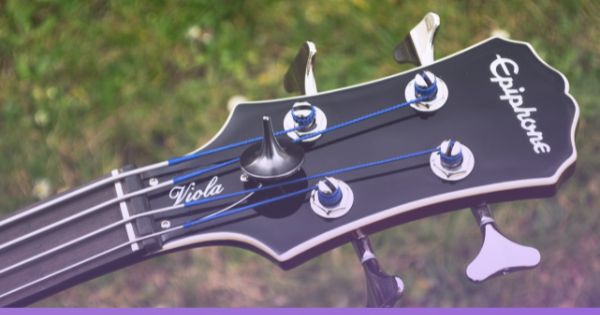Note: This guide has all the answers you’ll need for the question – Are Epiphone guitars good? If you’re thinking of choosing Epiphone as your next guitar brand then I’ve compiled detailed (and honest) information about Epiphone’s guitar types, models, their significance & alternate brands to help you make the right decision.

I know what you’re thinking: Is Epiphone a good brand? This is one question that I’ve been asked multiple times by fellow musicians or guitarists who are just starting out in their careers.
If you do a quick google search for guitars, the word Epiphone quickly appears on the list.
They are a reputable brand in the music business and produce anything from nylon string classical guitars to Les Paul and SG electric guitars.
The low to mid-priced market is where Epiphone excels, and they are closely tied to the well-known Gibson guitars in this regard.
With recent improvements in factory automation and their medium price point, Epiphone is able to produce models that are of excellent quality and were created by Gibson at incredibly low costs. Although they lack the high-end Gibson cousins’ finish details, they frequently offer better value for the money when compared on a dollar-for-dollar basis.
Allow me to assist you in making a decision on whether or not to get an Epiphone guitar if you’re thinking about it.
In this article, the quality of the Epiphone electric and acoustic guitar lines will be thoroughly examined as we take a closer look at these instruments and understand whether are Epiphone guitars any good?
Types of guitars by Epiphone and their significance
- Epiphone Acoustic Guitars:
The Epiphone AJ-220s is a particularly smooth Epiphone acoustic, even if the brand’s acoustic guitars aren’t generally thought to be up to par. Although warm, the tone is incredibly clear. The rattle and string noise that the other models slam into your ears is completely absent from this one. Rarely does an acoustic guitar have the crisp, ringing tones of this one. Every note shines out from the others and the sustain is incredible.The smaller, rounded shoulders make for a comfortable fit whether you’re standing or sitting, and the slim taper neck makes playing the instrument easy on the hands.
Epiphone Electric Guitars:
While the acoustic models of Epiphone are not completely up to the mark, you may also wonder that are Epiphone electric guitars good?However, worry not, the majority of Epiphone’s electric models feature rich, guitar-like tones and adaptability to fit a variety of musical styles.
The humbucker pick-ups flawlessly carry out their duties on all models, from Les Pauls to GSs. These devices may sing like a bird or chime like a handbell depending on the selector switch setting.
If you enjoy overdrive, nothing Gibson has created to date can match the crunch that an Epiphone can grind out.
From the quantity that has sold in recent years, it appears that the Les Paul Standard is a fan favourite. One of the finest qualities of this instrument is how well-rounded it is in a feather-light package.
Read: How Much Do Electric Guitars Weigh (11 Best-Selling Models)
Epiphone Bass Guitars:
Of all the bass guitar manufacturers in the US, Epiphone undoubtedly has the widest selection. The bass selection at Epiphone truly has something for everyone. These instruments’ bodies come in a variety of classic, traditional, modern, and inventive designs.For the bassist who prefers the classic unplugged sound, there is even an acoustic/electric bass and a semi-hollow bass. With the right adjustments, the majority of these basses can sound respectably nice yet ordinary. In fact, the EB-3 SG series, especially when played with a flat-pick, can nearly make a four-string bass sound macho.
The Viola bass guitar from the Epiphone range is deserving of special note. This bass guitar is a prince among basses!
This bass is smaller than most, being only 49 inches long and weighing little more than 12 pounds, but the powerful tone it creates more than makes up for its diminutive size.
What’s not so great about Epiphone Guitars:
While all the above guitars are really good for the price that they are available, the majority of Epiphone’s acoustic guitars are subpar copies of certain former outstanding models, despite their undeniable aesthetic beauty. For instance, the Epiphone Hummingbird Pro is a subpar recreation of the original Gibson Hummingbird from the 1960s.
The Gibson model is far superior to the Epiphone variant. There simply isn’t a comparison. The Gibson sings; the Epiphone’s best effort is to rattle.
They have absolutely little resonance or sustain, and they cannot project loudly enough to be heard in a concert situation.
Do Epiphone Make Good Quality Guitars? My Favourite Models
The short answer is that, in general, Epiphone makes high-quality guitars. Of course, there are exceptions, and it should be kept in mind that Epiphone is a budget model, so don’t anticipate quality on par with Gibson or Fender. However, Epiphone does make a decent instrument at a reduced cost.
The lengthy answer is that when it comes to Epiphone guitars, you need to be quite picky if you want to obtain the best value.
The originality of Epiphone is one of their strengths. Epiphone creates bold, colourful hues, intriguing arrangements, and gorgeous appointments in place of the flat, unimaginative wood colours so typical of Martin and Gibson.
Here are some Epiphone electric guitars that I truly like:
1. Epiphone Dot:
The Gibson ES-335, which has been played by notable performers like Dave Grohl, Otis Rush, Chuck Berry, and Mr. B.B. King, is the inspiration for The Dot. It had to be excellent, right? With two humbuckers, this guy has a lot of power and all the versatility buckers have to give. With none of the rattle and hum of single coil P90s, this instrument lends itself wonderfully to rhythm and lead playing. (I’m referring to you, Epiphone Casino.) This guy is a semi-hollowbody, which basically means that there is an additional block of wood inside the lower bout of a hollow body. There are several guitars, and cherry red makes a strong stage statement.
2. Epiphone Casino:
The Casino resembles the Dot quite a bit at first glance. However, two important distinctions exist between the two: the Casino has a full hollow body and two single-coil P90 pickups. The Casino is a significant blues and rock guitar due to the convergence of these two characteristics. The Casino is beloved because it is a bold-looking guitar with a highly forceful attack, and it is played by the Beatles and more contemporary acts like Gary Clark Jr.
3. Epiphone DR-100:
Without a doubt, and for all the right reasons, the DR 100 is one of Epiphone’s best-selling acoustic guitars. Even though it’s priced like a beginner’s acoustic, this instrument has the quality and tone that may satisfy both intermediate and experienced musicians.
It delivers on both hardware and appearance with to the antique black pickguard, dot inlays, quality tuners, and traditional dreadnought design. One of the most common tone wood combinations used today by players is the combination of Select Spruce (top) and Mahogany (back and sides).
Other Epiphone guitars are featured here:
- Epiphone Les Paul Special II – The Best Lightweight Electric Guitars
- Epiphone WILDKAT – The Best P90 Guitars
- Epiphone VIOLA – The Best Lightweight Bass Guitar
Where are Epiphone guitars made?
Epiphone guitars have a long history and it’s natural to be curious about who makes Epiphone guitars.
In its Long Island facility, Epiphone first made banjos before launching its first line of guitars in 1928.
In order to compete with Gibson, they began concentrating on f-hole design archtops, and by the middle of the 1930s, Epiphone’s guitars were widely regarded as the best option for musicians.
In 1957, Gibson struck a contract to buy Epiphone and utilise the name for their low-cost guitar line after realising that Epiphone had grown to be their fiercest rival.
After moving its manufacture from the US to Japan’s Matsumoto in 1970, Epiphone produced exclusively rebranded Matsumoku company-designed guitars for five years.
Epiphone had lost its way by the 1980s, and it wasn’t until 1986 when three Harvard MBAs purchased Gibson/Epiphone that things started to turn around.
In the 1980s, Epiphone’s manufacturing was relocated to South Korea, where Gibson used subcontractors like Samik to make their guitars.
Gibson constructed two plants in Quingdao, China, in 2004, where the majority of Epiphone guitars are produced.
Early Chinese models were of varying quality, therefore Korean-made Epiphones were favoured.
The majority of people now think that guitars built in Quingdao are on par with any other guitars because as Chinese factories improved their workflow, they soon caught up to the earlier Korean standards starting around 2006.
For the first time in many years, Epiphone began producing high-end Texan acoustic guitars in Boseman, Montana, in 2020.
Difference between Epiphone and Gibson guitars
One of the most recognisable guitars ever is the Gibson Les Paul. It is the guitar that countless aspiring musicians have always wished to own. Although Gibson guitars are fantastic, they may be rather pricey. Fortunately, Epiphone produces more affordable variations of these guitars. Oh, and a fun fact: Epiphone is actually owned by Gibson.
Since 1957, when the company that controlled Gibson acquired Epiphone, the two businesses have been affiliated. The Les Paul, SG, 335, and other guitars may be imitated by other brands, but only Gibson and Epiphone can truly claim ownership of these instruments. Along with making less expensive variations of popular Gibson models, Epiphone also creates some legendary, one-of-a-kind guitars. Other distinctions between Gibson and Epiphone are:
- The Materials:
The actual components and materials used by Gibson and Epiphone are another significant distinction. Gibsons are made from higher-quality wood, especially in premium models. The tops of Gibson Les Paul Standard and Epiphone Les Paul Standard, for instance, would frequently seem very different from one another. Because the Gibson is made of better quality maple. - Pickups:
The pickups are arguably the most important aspect of a guitar’s tone. While you play a chord, you can hear the individual notes more clearly when using a Gibson pickup because they are clearer and more defined. Gibson pickups also seem to have a broader frequency range, so the sound is fuller and more distinct when you play low or very high. - Hardware:
A Gibson has better hardware than an Epiphone because minor components like switches, knobs, and tuning pegs can degrade and break over time. The sustain of the guitar, which is important with Les Pauls, is influenced subtly by parts like the bridge and nut that are in direct touch with the strings. - The looks:
You’ll find that Gibson’s come in a wide range of sophisticated treatments and colours and that higher-grade wood looks nicer. Although it might not be a deal-breaker, if you’ve always admired Gibson players, you’ll note the difference in the headstock shape. A Gibson Les Paul has a little thicker body than its Epiphone equivalent.
Should you buy an Epiphone guitar?
Yes, to put it briefly. There are some really compelling reasons for that, so it’s not just a subjective assessment.
Although I would keep this point extremely specific to their selection of electric guitars, the first of those would be quality.
Why? Well, because Epiphone has a lot of knowledge in the field of electric guitars; these guys have been in the industry for a very long time.
Additionally, they produce some quite accurate knockoffs of well-known brands. Take Gibson as an example once more.
Gibson’s Les Paul electric guitar is among the most recognisable models of its kind to have ever graced recording studios.
Ironically, Epiphone’s Les Paul line produces some of the best guitars the company has ever made, albeit at a significant discount to the original. The Epiphone Les Paul offers a significantly better value than any Gibson guitar, including the Les Paul line itself, for even less than a fourth of the original price.
Overall, Epiphone guitars should be at the top of your list if you’re one of those beginner guitarists with good taste but a tight budget (or not).
Best alternatives for Epiphone
- Gibson – Gibson is among the most well-known names in the entire music business, and it makes sense why. They have one of the best sounds in the world, as the majority of guitarists would concur. A number of things contribute to this.
First off, humbucker pickups, which provide a wonderfully rich, warm tone, are frequently used in Gibson guitars.
Additionally, by doing this, hum can be prevented, which raises the guitar’s overall volume a little.
- Fender – Fender is the only company that can compete with Gibson’s fame. They have been used by some of the greatest guitarists of all time, like Jimi Hendrix and Eric Clapton, for a very long period.
- PRS – One of the most varied brands in the world is PRS. Each guitar in that price range is capable of nearly anything, and they have a portfolio of instruments that covers almost every possible niche a player may desire.
In Conclusion
What you want the guitar to do essentially determines whether or not it is “good.” Each player and genre will experience it differently.
Even though the majority of Epiphone guitars are not very impressive to seasoned players, they could be well worth the money for a novice or intermediate musician.
Epiphones are a great choice if you’re looking for a cheap guitar to practice and learn on.

Tania B.
Ola! I am Tania and I have studied music at Trinity College, London. My love for music started early when I was about 12 years old and I've been around the block when it comes to problems while buying a guitar that suits all your needs. I hope you find my tips useful!


